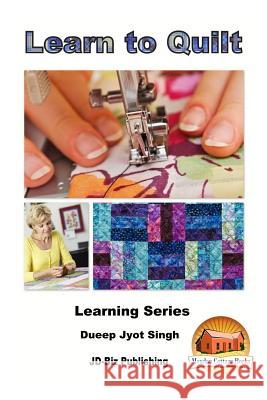Learn to Quilt » książka
Learn to Quilt
ISBN-13: 9781530037124 / Angielski / Miękka / 2016 / 66 str.
Table of Contents Introduction Tools and Materials Needed for Quilting Dressmaker pins Thread Scissors/fabric cutter Fabric Markers Iron and sewing machine Quilting Terminology Wadding and batting for stuffing Patchwork Fabric Choosing the right Fabric Tones, Shades, and Colors Preparing the Fabric Printed fabrics Remember - Using the Color Wheel Different Sizes of Quilts Borders and sashing Backing and Binding for the Quilt Cutting and Piecing the Fabric Using Paper Templates Machine Sewn Patchwork Chain Piecing How to Make a Pattern Eccentric Star Pattern Cat's Cradle Different Well-Known Templates Log Cabin Flying Geese Ohio Star Shoo Fly 4 Patch Traditional American Quilt 9 Patch 5 Patch 7 Patch Tumbling blocks Road to Heaven Windmill Hopscotch Double Pinwheel Crockett Cabin Spool and Bobbin Flock of Geese Crosses and Losses Flower Basket 9 Patch Blocks Darting Birds Puss in the Corner Different stitches used for Stitching Stippling stitch In the ditch Stitching Assembling the Quilt Conclusion Author Bio Publisher Introduction I just finished Barbara Michael's rather horrifying book - stitches in time, where an antiques shopkeeper gets hold of a traditional wedding quilt, in which evil has been stitched with every stitch. This black magic is added to the wedding quilt by a helpless 17-year-old beautiful slave whose rather monstrous and spoiled, self-centered mistress intends to sell her off after her own wedding and then orders her to make her wedding quilt. And evil is prayed into every stitch, every patch, every inch of the quilt cursing the mistress and her husband with death and destruction. And that took me to the idea of writing a book on quilting. Quilting has long been a tradition in many places where things of beauty were made by a group of women gathering together and gossiping in their leisure time while they made something useful for their families. In the East, traditionally was embroidery work done by the elderly women sitting in the sun, and stitching the clothes of their granddaughters. When one of my aunts got married, she wore a heavy veil of which every inch had been stitched lovingly by her friends every afternoon. That veil is, of course, 45 years old now, and a priceless heirloom. This was a traditional practice in many parts of the world, but also there was an age old practice of piecing together scrap patches of fabric and then sewing them by hand edge to edge to create decorative designs and patterns. Do not confuse patchwork with quilting. These are 2 different art forms often done together. Patchwork has gone back millenniums, in ancient Egypt, Asia, Africa, and Europe, when pieces of cloth which had been so long around that you really could not be bothered to repair the garment were gathered together and made into something useful for the house.
Zawartość książki może nie spełniać oczekiwań – reklamacje nie obejmują treści, która mogła nie być redakcyjnie ani merytorycznie opracowana.











